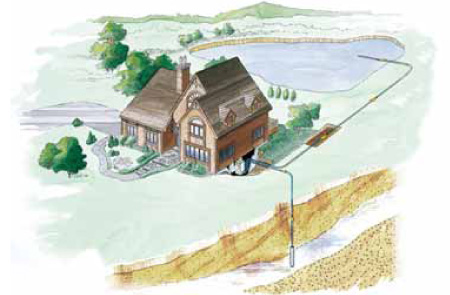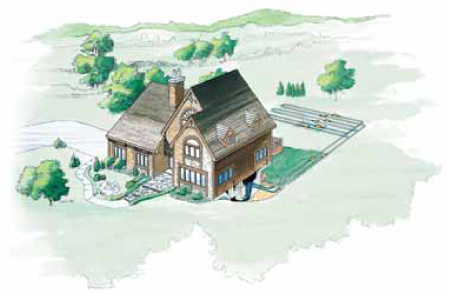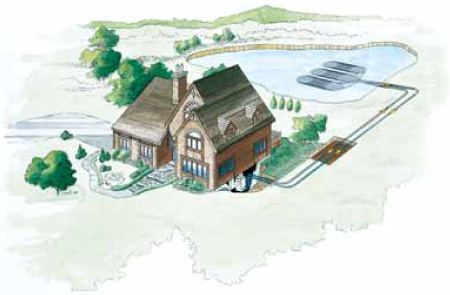
Geothermal Systems
Why is Geothermal the Smarter Choice?
Simply put, a geothermal heating and cooling system is:
- an investment in affordable comfort, and,
- an investment in the preservation of our environment for generations to come.
The secret of a geothermal HVAC system’s clean, efficient operation is the Earth’s ability to store heat. In fact, 47 percent of the sun’s energy that reaches our planet is absorbed into the Earth. That’s 500 times more energy than all of humanity would need in a year! And it’s an unlimited source of energy.
 Installing a geothermal system in a typical home is the environmental equivalent of planting 750 trees or taking two cars off the road. That’s because geothermal systems don’t burn fossil fuels nor do they emit carbon dioxide, which has been associated with the greenhouse effect and global warming.
Installing a geothermal system in a typical home is the environmental equivalent of planting 750 trees or taking two cars off the road. That’s because geothermal systems don’t burn fossil fuels nor do they emit carbon dioxide, which has been associated with the greenhouse effect and global warming.
The Geothermal Heat Pump Consortium says current geothermal systems save more than 14 million barrels of crude oil every year. And because the only energy needed to run geothermal systems is a small amount of electricity, they reduce the need for new coal-powered electric power plants.
Result? Cleaner air and less acid rain.
A Major Advantage: Four Times the Efficiency
A geothermal system uses the Earth’s thermal properties in conjunction with electricity to provide unprecedented efficiency. For every one unit of electricity the system uses, it provides four units of heating energy, giving a geothermal system a 400 percent efficiency rating. These numbers can translate into real savings on your utility bills year-round.
The Geothermal Advantage
When you invest in a geothermal system, you can be assured that you’re receiving the highest-quality, best-performing heating and cooling system available. Here are some of the benefits of geothermal ownership:
- Lower Operating Costs:
A geothermal system operates more efficiently than ordinary heating and air conditioning systems – 30 to 60 percent more efficiently in most cases. - Comfort:
Because a geothermal system uses the relatively stable temperature of the Earth as an energy source, you're assured of constant, balanced winter heating and better humidity control in the summertime. - Safety:
There are no flames, flues, or odors with a geothermal system. There's no danger of combustion, fire, or carbon monoxide poisoning either. You get safe, reliable operation year after year. - Clean Operation:
A geothermal heating and cooling system minimizes environmental threats linked to fossil-fuel burning, including acid rain, air pollution, and the greenhouse effect. - Quiet Operation:
Geothermal heating and cooling systems are designed and manufactured to be exceptionally quiet. It will run as quietly as your refrigerator or freezer. - Flexibility:
Geothermal systems provide heating, central air conditioning, and hot water – all from the same compact unit. - Economical Water Heating:
Water heating can be a significant energy expense. A geothermal system can reduce the high cost of water heating by as much as 66 percent. - Good Looks:
The completely self-contained indoor geothermal system needs no noisy, unsightly outside condensing unit. Your neighbors won't have any cause for complaint. - Great Warranties:
In the unlikely event of a service problem, geothermal systems are backed by the industry's best 10-year parts and labor warranty.
Proven Technology or a "Trophy"?
Geothermal technology is by no means recent technology. Water source heat pumps have been around for a long time. Tried and true methods of installing the water source heat pump are engineered to provide true energy efficiency and durable, long-lasting performance.
In recent years with the cost of installing a geothermal system on the rise, many companies are looking for ways to cut the up-front installation costs. These methods can be very costly in the long run. All heat pumps are rated on energy efficiency by one method. SEER and EER are the miles per gallon ratings that govern the water source heat pump.
A 13 SEER geothermal system will operate more expensively than a 21 SEER conventional system. An installation company that is not offering higher efficiencies in the geothermal system is not offering energy-efficient systems.
All consumers who are considering geothermal technology are seeking energy efficiency from their new system. Systems that are installed outside the parameters of standard engineering practices will not provide the energy efficiency and long-lasting durability these systems can provide.
At Archibald Heating and Air Conditioning, we adhere to the strict standards set forth by the equipment manufacturers. These standards have been created to ensure the equipment operates as advertised. When these standards are not followed, the installed systems will be less energy efficient, incur higher operating costs, and have a decreased equipment life-span with higher service costs.
Contact us today for a free, in-home consultation.
Geothermal systems can be installed with a variety of loop configurations. Digging a hole in the ground and “Dropping some pipe in there is not a recognized industry standard. Piping that has no spread on the piping installation will not operate as efficiently as properly installed piping loops.
There are two basic types of geothermal loop configurations: closed and open.
Open loop systems are the simplest. Water is drawn from one well, passed through the heat pump's exchanger and discharged through a second well.

Closed loop systems are becoming the most common because they are economical, efficient and reliable. Fluids are re-circulated through a continuous loop of buried pipes. We'll work with you to select the design that works best for your home or business.
Horizontal Closed Loops:

Horizontal closed loop installations are generally most cost-effective for small installations where sufficient land area is available. These involve burying pipe in trenches dug with back-hoes or chain trenchers.
Vertical Closed Loops:

Vertical closed loops are preferred in many situations where the soil is too shallow or land area required is prohibitive. These are installed using a drilling rig. The vertical bore loop piping system is by far the most efficient way to install loop piping. Drilling holes far down into the ground provides the most stable ground temperatures, thus providing the best efficiency. These systems are more expensive to install due to the cost of well drilling and the cost of grouting the wells once the piping is installed, but they provide the most efficient piping system. Most manufacturers will warranty the piping systems for long periods if installed properly by certified loop pipers.
Pond Closed Loops:

Pond closed loops are a special kind of closed loop system. Where there is a pond or stream deep enough and with enough flow, closed loop coils can be placed on the pond bottom.
